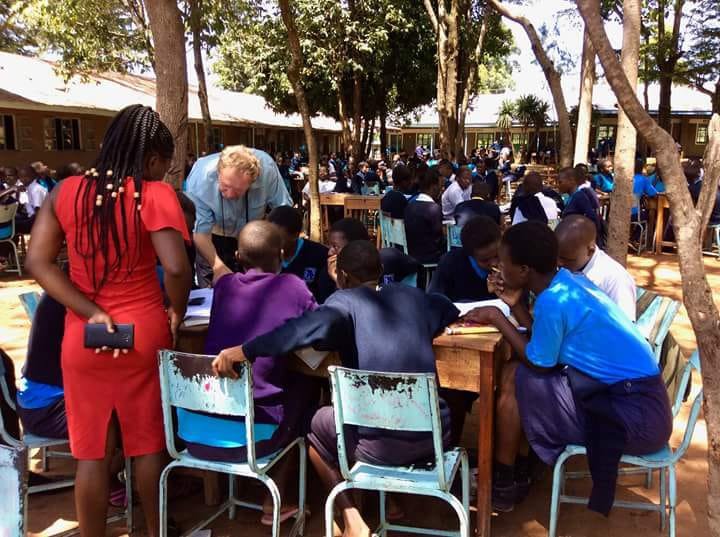Why do some Kenyan parents pay for boarding school?
On my first visit to Kenya in 2018 to research the book “Under the Acacia Tree” about the history of CES, I was surprised to see how many boarding schools there were. Many Kenyan parents seemed willing to send their children away, foregoing their help on the farm, and paying extra fees. An in many cases, CES has funded students attending boarding school.
This is quite unlike the system I’m used to in Canada, where boarding schools are rare, and most children are within walking distance, or can be bussed to school each day. So I asked about it.
People in Kenya were quick to enlighten me. They agreed that there are many fine day schools available. CES has good relationships with many day schools, has supported many students through them, and we’re pleased with the education these students receive.
But in some cases, sending secondary school students away to boarding school provides a better outcome.
Studying on a Saturday? Really?
I saw this on a visit to a boarding school that has had many students supported by CES. It was a Saturday, and we walked with one of the teachers into a courtyard filled with shade trees, tables, chairs … and what seemed to be the entire student body, working in groups, eagerly studying mathematics.
My Canadian brain was spinning. Saturday afternoon … secondary school students … studying … mathematics … and enjoying it. That doesn’t happen where I come from. And I was thinking: “I like this. Whatever they’re doing, it’s working.”
The teacher explained: “As you can see, they’re studying hard today, on a Saturday, in groups. Right now, they’re preparing for a mathematics contest that’s just for our school. You see that the principal is moving around to see how the groups are working. Soon they go back to class for the contest itself. It will be marked. We really want to build that culture for liking mathematics.”
What’s so great about boarding school in Kenya?
Interviews with students, teachers, parents and members of the CES family in Kenya pointed out several advantages to investing funds to place a student in a boarding school, rather than day school.
An environment more conducive to study
As the teacher on my campus tour pointed out, with a boarding school, the administration can provide a better study environment. This includes more reliable electrical lighting -- many of our students come from homes without electrical power, so when the sunlight stops, the studying stops. Reference materials are more readily available. Students can more easily borrow each other’s’ notes to help with studying. And since most other students spend their time studying rather than getting into trouble, even weak students get supported in their academic pursuits.
Fewer family distractions
Most of our students come from rural properties, or “shambas,” and families tend to be large. Day-school students may be under pressure to gather firewood, carry water, prepare meals, care for younger siblings or other obligations. Girls, in particular, may be held back from school because of family distractions.
But if they’re safely behind the boarding school gates, they’re able to avoid family dramas and duties, and focus on their academic achievement.
Safer for girls
One of the principals of a girls’ boarding school told me that girls are particularly vulnerable on their way to and from school. It’s one reason that they tend to travel in groups (singing!) for mutual support and protection. Many of the rural roads in western Kenya are quite frankly terrible – with huge potholes, muddy in the rainy seasons, and dusty in the dry. Girls may be at risk from drivers who offer them a ride.
A better chance for a quality education
Kenyan secondary schools vary greatly in their quality. If the schools within walking distance of a student’s home are substandard, that child has little chance of doing well in the all-important national examinations at the end of elementary and secondary school. They also won’t learn much. But if the students can attend a boarding school, distance doesn’t matter as much – so parents have a greater choice of schools. They can avoid those with a bad reputation, helping their offspring gain a brighter future.
More help from teachers, fellow students
In a residential environment, students are more easily able to ask for help with their schoolwork from classmates, older students, and teachers – who may be better able to help than parents.
Avoiding bad influences
Day-school students may be pulled into misuse of alcohol or drugs, or criminal activity, by their friends whose parents could not afford to send them to school. In a boarding school, that sort of behaviour is easy to spot and deal with before it gets serious.
As the teacher on my campus tour of the boarding school said, “In a boarding school environment, we can support their self-control around being focused. When they are away from the school, that self control may not be there. Given Kenyan life and home realities, it could be that at a day school, so many of them get alternately hopeful about learning and then pulled down into despair by their home circumstances.
“But when they are kept within the school they’ll keep studying, even on a Saturday. On Sunday they are likely committed to church issues, and soon enough they find that the weekend is over. By the next day, it will be back to school.”
Avoiding the downsides of boarding school
I’ve been told that there are two downsides to boarding schools in Kenya, that must be managed.
One is separation from one’s family, and naturally the students miss their parents and relatives. But they can go home for weekends, and there are extensive vacations.
The other is cost. Many families in Kakamega County, where we focus our work, would love to give their children the benefit of a boarding school education. But they can’t afford it – particularly if they have several children for whom they need to find school fees. It’s particularly hard when they have a bright, ambitious student who has the potential to go on to higher education, get a good job and help lift their whole family out of poverty.
CES donors have made it possible for us to support many students through their boarding school education. By a contribution of C$xxx, or $XXX per month, you can fund a scholarship to help a Kenyan student attend boarding school, and gain a brighter future.
CES donors have made it possible for us to support many students through their boarding school education. By a contribution of C$400 or $33 per month, you can fund a scholarship to help a Kenyan student attend boarding school, and gain a brighter future.

